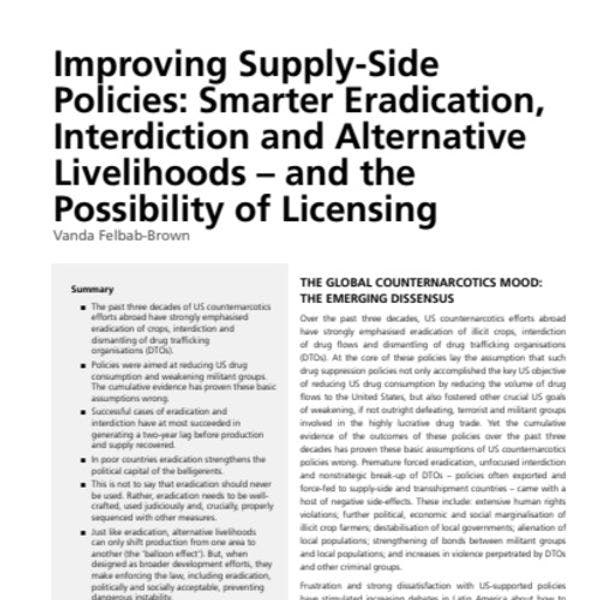Improving supply-side policies: Smarter eradication, interdiction and alternative livelihoods – and the possibility of licensing
Over the past three decades, US counternarcotics efforts abroad have strongly emphasised eradication of illicit crops, interdiction of drug flows and dismantling of drug trafficking organisations (DTOs). At the core of these policies lay the assumption that such drug suppression policies not only accomplished the key US objective of reducing US drug consumption by reducing the volume of drug flows to the United States, but also fostered other crucial US goals of weakening, if not outright defeating, terrorist and militant groups involved in the highly lucrative drug trade. Yet the cumulative evidence of the outcomes of these policies over the past three decades has proven these basic assumptions of US counternarcotics policies wrong.
Premature forced eradication, unfocused interdiction and nonstrategic break-up of DTOs – policies often exported and force-fed to supply-side and transshipment countries – came with a host of negative side-effects. These include: extensive human rights violations; further political, economic and social marginalisation of illicit crop farmers; destabilisation of local governments; alienation of local populations; strengthening of bonds between militant groups and local populations; and increases in violence perpetrated by DTOs and other criminal groups.
Frustration and strong dissatisfaction with US-supported policies have stimulated increasing debates in Latin America about how to redesign policies toward the drug trade, including various forms of decriminalisation and legalisation of at least some narcotics, such as cannabis.
Such calls for reform have not been echoed in other parts of the world, however. Russia in particular has been at the forefront of calls for toughening policies. China has also embraced existing policies and many countries in Asia and the Middle East continue to defend their harsh punishments of users as well as local dealers.
Among many drug policy reformers, there is an emerging consensus that decriminalisation, public health, treatment and harm reductionbased policies and even legalising some drugs (such as cannabis in Uruguay) are more appropriate than punitive policies for controlling consumption.
Keep up-to-date with drug policy developments by subscribing to the IDPC Monthly Alert.
Downloads
Topics
Regions
Related Profiles
- Brookings Institution
- Vanda Felbab-Brown
